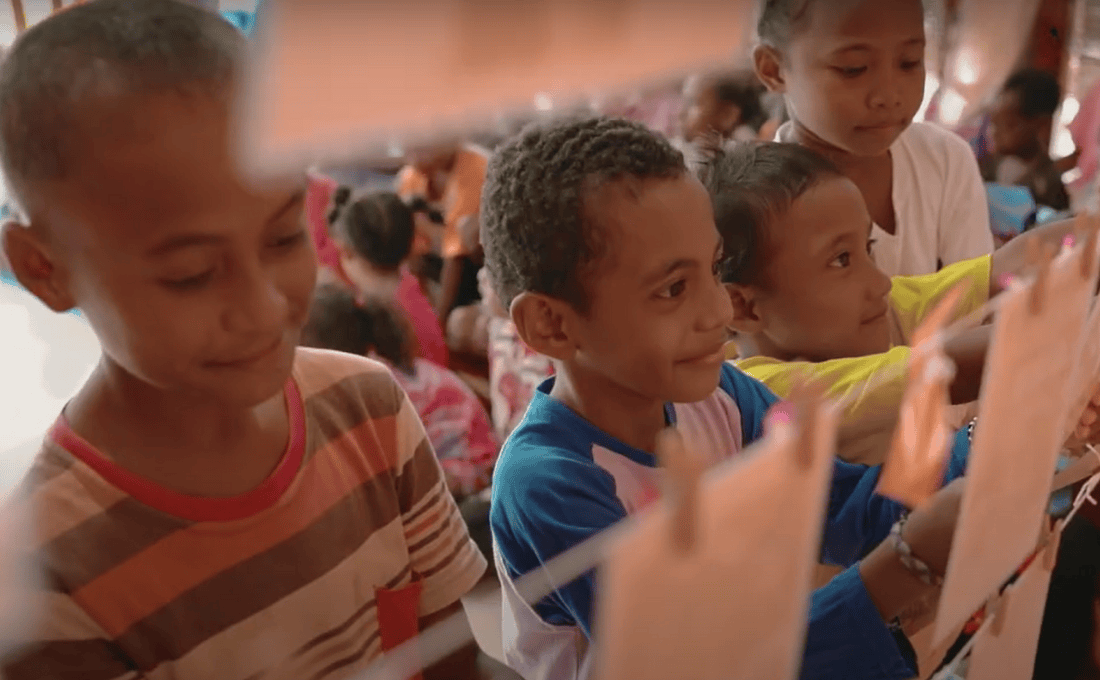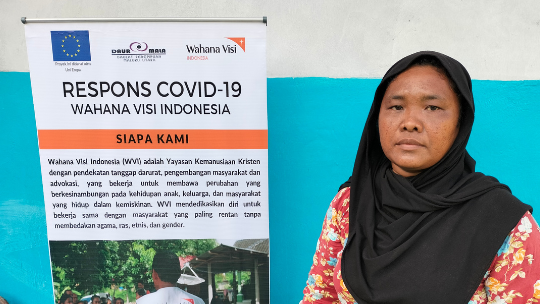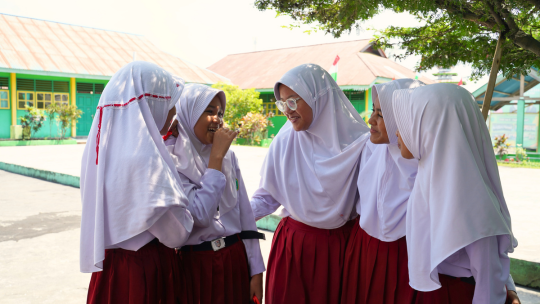How the Economic Crisis Impacts Children's Education: 5 Key Effects and Solutions

Despite significant advancements globally over the past few generations, millions of children are still caught in cycles of poverty, undernourishment, and restricted access to education. Consequently, we require forward-thinking programmes to assist children in need.
Now, there's 'Chosen', an initiative that can empower children to grow and access a proper education. So, what exactly is 'Chosen'? 'Chosen' represents an opportunity for them to shape their own destinies.
The 'Chosen' programme from Wahana Visi Indonesia (WVI) aims to transform how children perceive their future. Instead of being selected by a sponsor, children are empowered to choose who will support them.
Education is a fundamental right for all children, yet the reality is that many are denied this. Just picture how different a person's life would be if they never attended school, never learned to read or write.
Under these conditions, the key challenge is access to schools and guaranteeing that every child has the liberty to learn and flourish in line with their abilities.
Consequently, 'Chosen' signifies the provision of options, something previously beyond the reach of numerous children. Here, 'Chosen' implies something that has been picked with thorough thought.
As we are aware, an economic crisis can jeopardise families' financial stability, while also carrying significant ramifications for the future of young people. School, once a place of hopeful learning, now transforms into a difficult hurdle for some children to clear.
The expense of education continues its upward trajectory, the scarcity of support facilities, and the limited pool of qualified educators are increasingly apparent as barriers. In this scenario, the question that arises shifts from "which school shall we select?" to "can school still feature in their lives at all?"
Education, which ought to be a basic entitlement for every child, is ironically one of the sectors most severely impacted by the economic downturn. Indeed, at its core, education is the bedrock of a brighter tomorrow. However, for many children in Indonesia, the economic crisis renders it increasingly unattainable.
With the escalating cost of living, numerous families are forced to prioritise other necessities over educational expenses. Consequently, school dropout figures rise, the standard of education deteriorates, and access to learning resources becomes ever more restricted.
Furthermore, there are several other consequences of the economic crisis that could jeopardise the educational standards of children. Below are five primary impacts of the economic crisis on children's education and how we can collectively address them.
1. When 'Chosen' Becomes a Privilege: The Escalating Issue of Children Leaving School Early
As previously outlined, for the majority of children, school is a fundamental entitlement and should be accessible without hindrance. However, in the current climate of economic instability, this right is sadly becoming a privilege enjoyed by only a minority.
Numerous children are being compelled to abandon their schooling, not out of a lack of desire to learn, but due to the necessity of assisting their parents in earning an income. A stark choice they must face to avoid complete withdrawal from education. Consequently, dropping out of school is becoming a harsh reality for many children.
Particularly those from families with meagre incomes. Education, which should unlock pathways to the future, is instead being shut off due to financial hardship.
With such limited access to education, they are forced to confront the reality that the job market is their sole remaining option, despite their age being insufficient to shoulder such responsibilities.
In certain regions, particularly rural and isolated areas, this issue is causing increasing concern. Parents who have lost their jobs due to recession or redundancy are no longer in a position to afford their children's education.
For some families, covering school fees, purchasing uniforms, or even simply providing a packed lunch has become a significant financial strain. In these circumstances, children are being forced to participate in the struggle for survival.
Children are reluctantly having to work in fields, sell goods on the streets, or undertake other forms of labour that should not fall to them. Therefore, 'Chosen' aims to empower children by allowing them to select a sponsor who will support their education, thus preventing the sacrifice of precious learning time.
2. The Deterioration of Educational Standards: 'Chosen' Means Children Can Achieve Optimal Education
It's not just the number of school dropouts that's increasing; the quality of education is also experiencing a significant decline. Schools facing funding shortages are frequently compelled to reduce teaching staff, postpone facility maintenance, and restrict access to learning materials.
Under such circumstances, even children who remain in school do not receive an optimal education. When schools lack sufficient funds to provide books, laboratories, or adequate learning facilities, the standard of children's learning inevitably falls far short of ideal.
Consequently, they struggle to comprehend the subject matter, which ultimately impacts their academic performance. 'Chosen' represents a choice, but without adequate support, children forfeit the opportunity to receive a quality education.
3. 'Chosen' Means Providing Children with the Opportunity to Gain Knowledge Amidst Limited Access to Inclusive Education
Children with special needs are among the groups most severely affected by the economic crisis. Inclusive schools necessitate specialised facilities and teaching staff, which incur higher costs compared to mainstream schools. Regrettably, in challenging economic circumstances, many schools are compelled to curtail inclusive education programmes or even close them entirely.
As access to inclusive education becomes increasingly restricted, children with special needs forfeit the opportunity to learn and develop in accordance with their potential.
Families with children who have special needs also confront a significant dilemma, as the escalating costs of education force them to choose between basic necessities and their child's education. 'Chosen' signifies the provision of freedom in selection, enabling the ability to realise aspirations amidst constrained access.
4. Low Levels of Reading Interest and Literacy
The economic crisis is also impacting children's reading interest and literacy levels. When household finances decline, procuring books or accessing quality reading materials becomes an unaffordable expense for many.
'Chosen' signifies possessing the option to cultivate oneself, thereby retaining the opportunity to broaden one's horizons. The consequence of this limitation is that children lose access to both printed books and technologies that support digital learning.
Numerous schools are unable to provide e-learning facilities, causing children from less affluent families to fall further behind in an increasingly technology-driven educational landscape.
5. Insufficient Intake of Balanced Nutrition for School Children
Effective education stems not only from curriculum and instruction but also from the physical well-being of children. Regrettably, economic crises frequently lead to diminished access to nutritious food.
This undoubtedly has a direct impact on children's concentration and learning capabilities. 'Chosen' signifies possessing the opportunity to develop with adequate nutritional intake; without it, children struggle to reach their full potential.
Children experiencing nutritional deficiencies tend to exhibit reduced concentration in class, increased fatigue, and heightened susceptibility to illness. This affects their engagement in learning activities and diminishes their academic achievements. If this issue is not promptly addressed, the repercussions will be long-lasting and will affect the future of succeeding generations.
How Can We Contribute?
Notwithstanding the considerable challenges posed by the economic crisis to children's education, numerous avenues exist to support them in retaining educational opportunities. One such beneficial initiative is the 'Chosen' programme by Wahana Visi Indonesia.
Through this programme, children are empowered to select a sponsor who will support their education, provide access to improved learning facilities, and assist them in breaking free from the cycle of poverty.
Society has a vital role to play in ensuring that every child receives the opportunity to attend school and develop. Through child sponsorship programmes, we can provide tangible assistance to those in need.
'Chosen' signifies granting children the autonomy to determine their own futures. With appropriate support, they can surmount challenges and realise their aspirations.
Help us make the dreams of Indonesian children for a better life a reality through the 'Chosen' programme. Visit wahanavisi.org/chosen for further information and commence your journey in providing hope!



